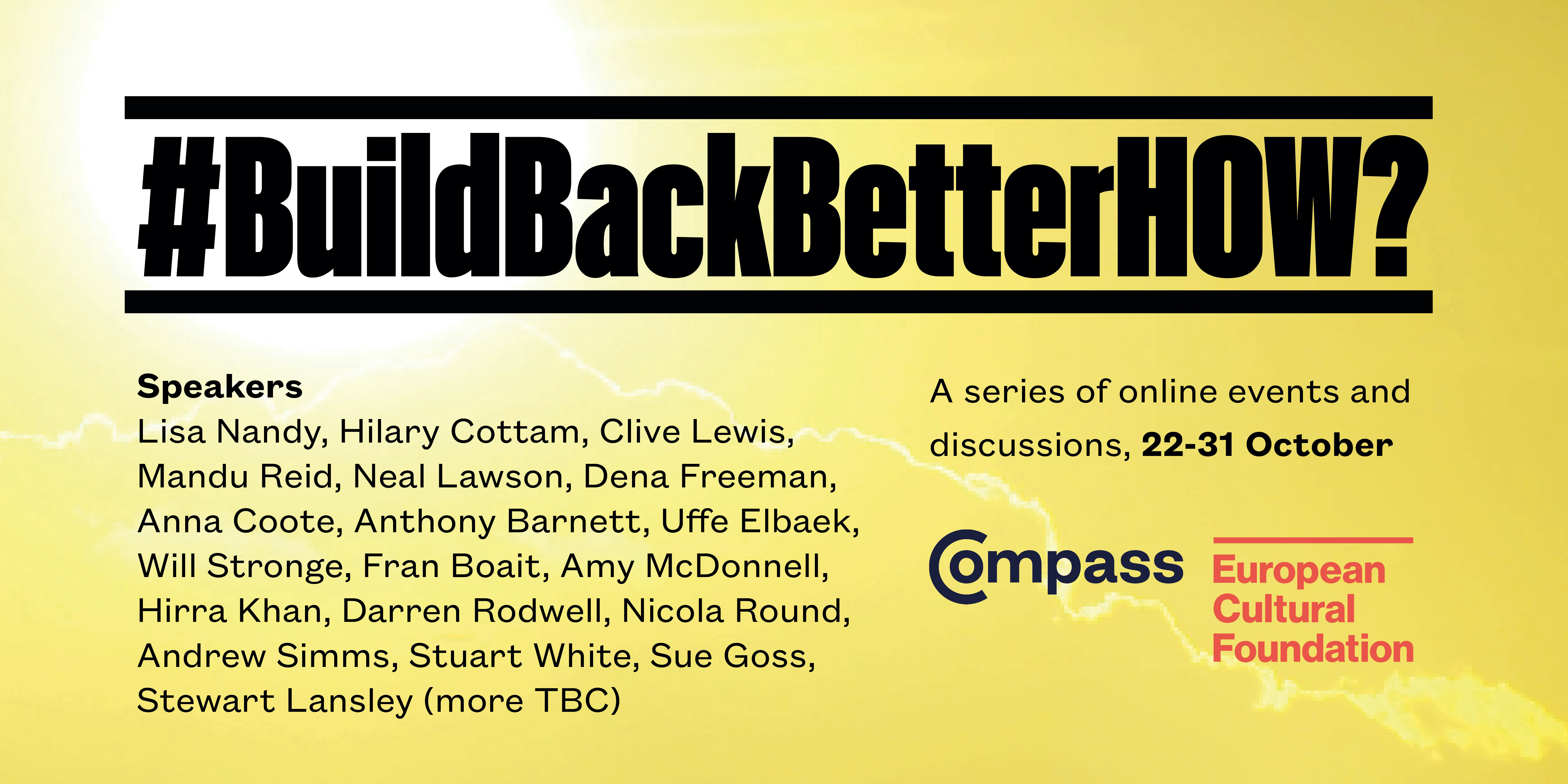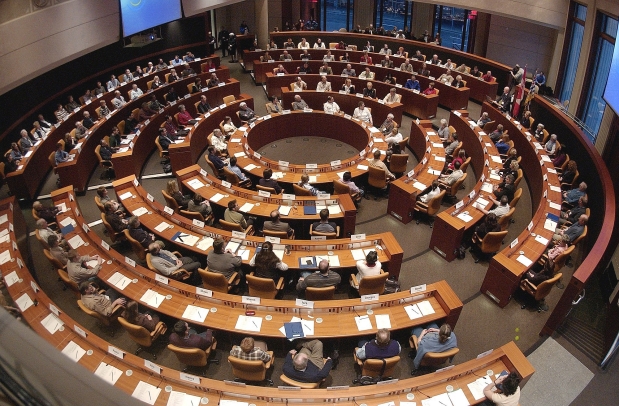Citizens assemblies to #BuildBackBetter
Posted on 11 Nov 2020 Categories: Blog, Climate crisis, Local initiatives, New democratic models, Citizens' Assemblies, The state we want
by Caroline Hartnell
When we think about building back better, we are thinking about power and how we make decisions, said Compass’s Frances Foley, introducing a webinar on citizens assemblies called Deliberating and doing: How? on 30 October. ‘We’ve been going through a period of democratic turbulence,’ she said. ‘How can people be more involved?’ It seems that some sort of deliberative democracy is needed.

Why citizens assemblies?
‘To #BuildBackBetter, we need to build back with, at every level of government,’ said Sarah Allan of Involve – here echoing Mary Parker Follett’s distinction between ‘power with’ and ‘power over’, often referred to by Barry Knight in blogs for Rethinking Poverty. And it’s already happening, she said – she herself has been involved in a number of citizens assemblies. She gave a local and a national example. In Bristol, she recounted, the city council wanted both to understand the impact of Covid-19 and to address inequality. The process started with focus groups on how Covid had affected people, followed by a survey at the beginning of August, then a citizens assembly to look at important and divisive issues. The outcomes of the assembly will inform Bristol’s recovery plan and the annual refresh of their One City Plan, which aims to create a ‘fair, healthy, sustainable city’.
At the national level, the Climate Assembly UK, commissioned by six Select Committees of the House of Commons, was the first ever UK-wide citizens assembly on climate change. The UK has agreed to meet a carbon zero target by 2050; the assembly’s remit was to consider how the UK should actually meet this target. The process brought together 108 people meeting over six weekends. Their report on 10 September gave a wide range of recommendations, including the need for local and national engagement and for a green recovery to further the carbon zero target. A major inquiry into the findings has now been launched to monitor progress, and the government will consider the assembly’s findings closely.
Citizens assemblies should be part of a wider engagement process, not stand-alone events, Allan emphasized. In Camden, the council crowdsourced ideas before holding a citizens assembly on the climate crisis, thus looking to involve more residents in the formulation of recommendations. In Ireland, a citizens assembly led to referendums on abortion and gay marriage. While a citizens assembly can provide high-quality debate, only a small number of people are involved, so following a citizens assembly with a referendum, as in Ireland, is ideal.

Why is it so important to build back with?
Allan put forward a number of reasons why building back with should be the norm not the exception:
- We get better decisions and policies if we bring in a wide range of ideas.
- It helps to unblock progress if there’s a political impasse. If a community is divided, a citizens assembly can help it to move forward.
- If we want a healthy democracy, we need to do better than five-year elections.
When it comes to unblocking impasses and overcoming differences, it is important to ensure that all strands of opinion are represented, including groups that will be especially affected by an issue, for example fossil fuel workers and farm workers in the case of the climate assembly. In fact the climate assembly included a gas fitter who ended up wanting to get rid of his own job – provided retraining and alternative jobs were created.
The Climate and Ecological Emergency Bill, put forward on 2 September by Caroline Lucas, sets out what needs to be done to avert climate catastrophe, and includes a demand for a citizens assembly. Amy McDonnell, a co-founder of the CEE Bill Alliance, echoed some of Allan’s points about the advantages of citizens assemblies.
Why do we need deliberative democracy? If we are to #BuildBackBetter, people need to understand the issues and the lifestyle changes required if we are to address the climate and ecological emergency. ‘Politicians need our help,’ said McDonnell. ‘We need to hold them to account. Government is not now keeping up with its 2050 targets and everyone needs to know about this.’ We need citizen action to demand an emergency strategy and to work with government and Parliament to create one, she said.
Giving legitimacy to electoral reform
A citizens assembly could in some circumstances help the government by giving it legitimacy, in the view of Stuart White, professor of politics at Oxford. Many people support democratic reform, he said, recognizing that the UK’s ‘first past the post’ electoral system is no longer fit for purpose. Will getting a progressive government elected and introducing proportional representation (PR) be enough? It’s legitimate because our constitution is based on Parliamentary sovereignty, he said. But the problem with Parliament legislating for PR is that ‘it conflicts with the principle that politicians shouldn’t decide by themselves what the rules should be. There’s a conflict of interest.’

The UK has recently developed a convention that limits Parliament’s power to change the political system, said White, and we have seen referendums on Brexit, AV (alternative vote, a version of PR), Scottish independence, and devolution. But this ‘emerging referendum settlement’ is increasingly being questioned, and a citizens assembly offers an alternative: a representative sample of the public tasked with answering a specific question. Citizens assemblies on electoral reform have been held in Canada – in British Columbia in 2004 and in Ontario in 2006 – and in the Netherlands in 2006. There is of course a risk that the citizens assembly will not recommend PR, but if reform is recommended, this gives it legitimacy.
More generally, facing as we do a widespread loss of faith in the democratic system, could citizens assemblies offer a path to greater citizen involvement and renewed faith in democracy?
Want to keep up-to-date with more articles like this? Sign up to our newsletter.
Posted on 11 Nov 2020 Categories: Blog, Climate crisis, Local initiatives, New democratic models, Citizens' Assemblies, The state we want
